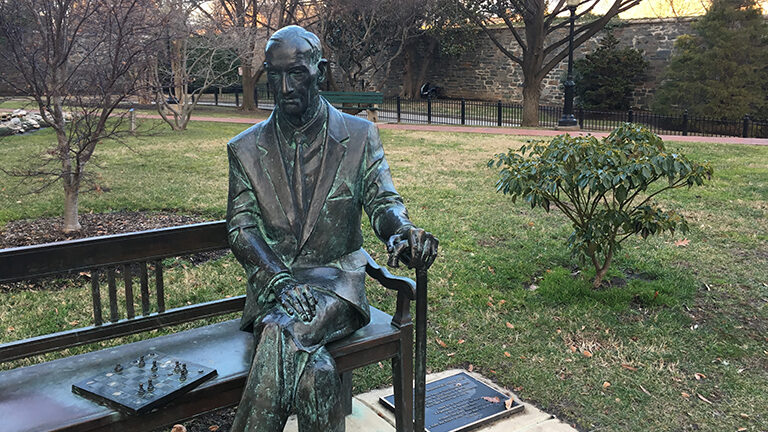FASPE To Honor Longtime SFS Professor Jan Karski
January 24, 2017 — On the east side of White-Gravenor Hall, on a bench next to the koi pond, there is statue of a well-dressed gentleman playing chess. At first glance, it’s not particularly remarkable — the old man playing chess is something of a trope in public parks, after all — but the statue in fact represents one of the most beloved members of the Georgetown family.
Dr. Jan Karski (G’52) was many things to Georgetown — a beloved professor, writer, and colleague, to name a few — but to the world, he was known as one of the first to warn Western powers of the horrors of the Holocaust.
“The Polish government in exile sent him with not only eyewitness accounts of what he saw in different camps and ghettos — of Jews being slaughtered by the tens of thousands — but also with testimonies, maps, etc.,” said Fr. Dennis McManus, a professor in the School of Foreign Service who knew Karski in the 1990s.
Karski’s initial mission did not succeed, as the U.S. government treated his reports as too sensational to be true. But he stayed in Washington, and throughout a long and prolific academic career at Georgetown, he ensured people never forgot the genocide. Now, due in part to the work of Georgetown College advisory board member Fred Marino (FLL’68), an organization dedicated to preserving Karski’s mission among young professionals will honor him with a posthumous award on Jan. 30 in New York.
The Fellowship at Auschwitz for the Study of Professional Ethics (FASPE) aims to educate young professionals in various fields through exposure to the systemic failures that led to the Holocaust. Over the course of 12 days, students pursuing advanced degrees in law, medicine, business, journalism or the seminary learn how lapses of ethical behavior in their professions was crucial to the rise of the Nazi Party and subsequent genocide. The fellows all travel to Holocaust sites in Germany and Poland to see the results of these failures in person.
According to Marino, who co-founded FASPE and serves on its Board of Directors, the program aims to dispel the common myth that genocide can happen with the will of only a few powerful people.
“People tend to brush off the Nazi era as a few delusional leaders at the top driving society in a certain way,” he said. “They don’t understand how comprehensive this breakdown was. It was only carried out effectively with the cooperation of the lawyers, doctors, and scientists.”
The program is not strictly a history or a social science lesson, but an ethical leadership training that uses the lessons of the most dramatic societal breakdown in modern history to drive home the importance of ethical behavior in the professional class.
FASPE is eight years old, but the organization only began celebrating historical and modern figures who embodied its mission last year. With its strong Georgetown connections — the philosophy department’s Fr. John Langan helped design the curriculum, and McManus sits on its academic committee — it makes sense that one of FASPE’s first awards go to Karski.
According to McManus, the incredibly accomplished professor rarely discussed his own bravery. In fact, by the 1980s, many on campus had no idea of the old professor’s past as a freedom fighter and whistleblower. But even as he kept quiet about his own role, Karski never stopped reminding people that the horrors he had witnessed could happen again and imploring them to remain vigilant against religiously motivated violence.
“One night at dinner, he recounted to me what happened,” McManus said. “He took his finger and poked it into my chest and said ‘You must not fail. I failed. You must not. Don’t quit. Don’t stop.’”
Marino has remained heavily involved in university goings-on for years — he’s been a major donor and advisor to the College, the Faculty of Languages and Linguistics, the Provost’s Office, and the University Library — and he still touts his Georgetown education for teaching him mental agility and worldliness that served him well in the business world. But given his passion for Holocaust remembrance and leadership in FASPE, bestowing an award on Karski represents an honor for Marino.
“FASPE has allowed me to combine my love of Georgetown with my passion for ethical leadership in a powerful program that inspires future leaders,” Marino said.
- Tagged
- Alumni
- Awards
- Government
